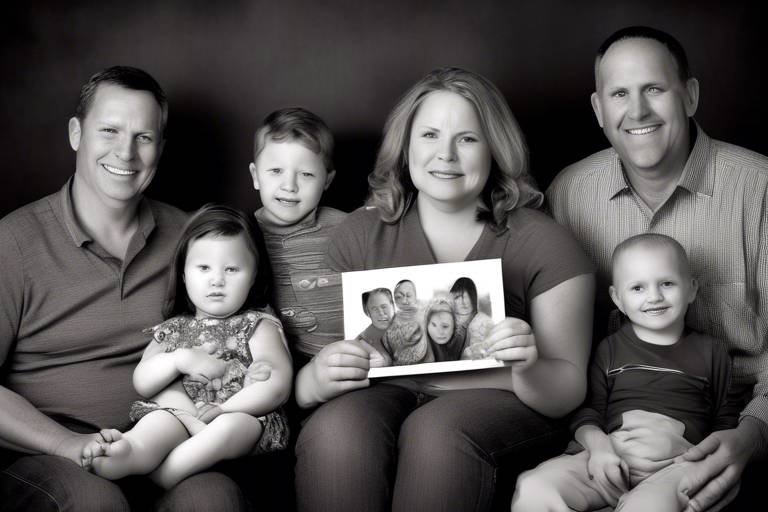Offering Sibling Support for Your Special Needs Child
When you think about raising a special needs child, it’s easy to focus solely on their needs and challenges. However, let’s not forget about their siblings! These kids are often the unsung heroes of the family, navigating a complex emotional landscape that can be both rewarding and challenging. Supporting siblings of special needs children is not just beneficial for them; it creates a healthier family dynamic and fosters a sense of inclusivity. After all, a family is like a team, and every team member deserves attention and support.
Imagine being a sibling who sometimes feels overshadowed by a brother or sister who requires more time and energy from parents. It can be tough, right? These siblings may experience a whirlwind of emotions, from feelings of jealousy and resentment to compassion and love. It’s crucial to acknowledge that their feelings are valid and deserve to be heard. By providing support and understanding, you can help them navigate their unique challenges while fostering a strong bond within the family.
In this article, we will explore various strategies to support siblings of special needs children. We’ll discuss the importance of open communication, creating safe spaces for expression, and involving siblings in caregiving activities. By equipping yourself with these tools, you can ensure that every child in your family feels valued and included, paving the way for a harmonious family environment.
Being a sibling of a special needs child can be a double-edged sword. On one hand, siblings often develop incredible empathy and resilience; on the other hand, they may struggle with feelings of isolation or neglect. It’s essential to recognize that these children are not just “the other kids” in the family; they have their own experiences, needs, and emotions that deserve attention.
Research shows that siblings of children with special needs may face challenges such as:
- Emotional Burden: Feelings of guilt, anxiety, or sadness can arise from their sibling's condition.
- Social Isolation: They may feel left out or unable to relate to their peers, leading to loneliness.
- Role Reversal: Some siblings take on caregiving roles too early, which can be overwhelming.
By understanding these challenges, parents can take proactive steps to ensure that siblings feel supported and understood. This understanding is the first step in building a family environment that nurtures every member.
Effective communication is the glue that holds families together, especially when navigating the complexities of special needs. It’s vital to create an environment where every sibling feels safe to share their thoughts and feelings without fear of judgment. But how do you foster this open dialogue? Here are some strategies:
It's essential to provide a safe environment where siblings can express their feelings honestly. Encourage them to talk about their emotions, whether they’re feeling happy, sad, frustrated, or confused. You might say, "It's okay to feel upset sometimes; let’s talk about it." This kind of reassurance helps siblings feel comfortable opening up.
Active listening goes a long way in enhancing sibling relationships. When a sibling shares their thoughts, make sure to give them your full attention. This means putting down your phone, making eye contact, and responding thoughtfully. You might ask questions like, "How did that make you feel?" or "What do you think we can do about that?" This approach validates their feelings and shows that you care.
Consider establishing regular family meetings to facilitate communication. These meetings can be a platform for everyone to share their thoughts and feelings in a structured yet supportive environment. You can discuss family plans, celebrate achievements, or simply check in with one another. This practice not only encourages open dialogue but also strengthens family bonds.
Fostering empathy is crucial for sibling relationships, especially in the context of special needs. Parents can guide siblings in understanding and appreciating each other’s unique challenges and strengths. For instance, you might encourage them to engage in activities together that highlight their different abilities. This could be as simple as collaborating on a school project or playing a game that requires teamwork.
By nurturing empathy, you’re not just helping them understand one another; you’re also laying the groundwork for a lifetime of supportive relationships.
Involving siblings in caregiving activities can significantly strengthen their bonds. When siblings share responsibilities, they not only feel included but also gain a sense of purpose. It's like being part of a secret club where everyone has a role to play!
Assigning age-appropriate tasks can help siblings feel empowered and included. For example, younger siblings might help with simple tasks like fetching toys or reading stories, while older siblings can assist with more complex needs, such as helping with homework or accompanying the special needs sibling to appointments. This involvement fosters teamwork and creates shared experiences that can enhance their relationship.
Recognizing and celebrating sibling achievements, no matter how small, promotes positivity within the family. Acknowledge milestones like completing a project or mastering a new skill. This recognition not only boosts their self-esteem but also reinforces the idea that every family member’s contributions are valued.
Q: How can I help my child feel less isolated as a sibling of a special needs child?
A: Encourage open communication, involve them in caregiving tasks, and create opportunities for them to bond with their special needs sibling through shared activities.
Q: What should I do if my child expresses jealousy towards their special needs sibling?
A: Acknowledge their feelings, provide reassurance, and encourage them to share their thoughts. Help them understand that it’s okay to feel this way and that their feelings are valid.
Q: How often should we have family meetings?
A: Aim for regular family meetings, perhaps once a week or biweekly, to ensure everyone has a chance to share their thoughts and feelings.

Understanding the Impact on Siblings
Siblings of special needs children often navigate a complex emotional landscape that can be both challenging and rewarding. These children may experience a range of feelings, from pride in their sibling's unique abilities to frustration or even resentment due to the attention their special needs sibling requires. It's crucial to understand that their experiences are just as valid and significant as those of the child with special needs.
The emotional impact on siblings can manifest in various ways. For instance, they might feel overlooked or burdened by the additional responsibilities that come with having a sibling who requires extra care. This can lead to feelings of guilt when they wish for a more typical sibling experience or when they seek independence. It's essential to recognize that these emotions are normal, and acknowledging them is the first step toward fostering a supportive family environment.
Socially, siblings of special needs children may face unique challenges as well. They might struggle to form friendships, particularly if their peers don't understand their family dynamics. This can lead to feelings of isolation, making it imperative for parents to create opportunities for social interaction outside the home. Encouraging friendships and connections with other families in similar situations can help alleviate some of these feelings.
Furthermore, the impact on siblings can vary significantly based on their age and developmental stage. Younger siblings might not fully comprehend the situation, leading to confusion or fear, while older siblings may take on a caregiving role that can be emotionally taxing. It's important to tailor support to each child's needs, ensuring that they feel valued and understood.
To illustrate the emotional and social effects on siblings, consider the following table that outlines common feelings and potential responses:
| Common Feelings | Potential Responses |
|---|---|
| Guilt | Encourage open discussions about feelings; reassure them that it's okay to have mixed emotions. |
| Isolation | Facilitate playdates or support groups with other siblings of special needs children. |
| Frustration | Teach coping strategies and provide outlets for expressing their feelings, like art or journaling. |
| Pride | Celebrate achievements of both siblings, fostering a sense of teamwork and shared joy. |
In summary, understanding the impact on siblings of special needs children is vital for fostering a healthy family dynamic. By recognizing their feelings and experiences, parents can help create an environment where all children feel valued and understood. This not only strengthens sibling bonds but also promotes emotional well-being for the entire family.

Encouraging Open Communication
Effective communication is the cornerstone of any healthy relationship, and when it comes to families with special needs children, it becomes even more crucial. Siblings often navigate a complex emotional landscape, filled with feelings of confusion, frustration, and sometimes even resentment. By fostering open dialogue, parents can ensure that every family member feels heard and understood. But how can you create an environment where everyone is comfortable expressing their thoughts and feelings?
First and foremost, it's essential to create a culture of openness in your household. This means encouraging siblings to share their experiences and emotions without fear of judgment. You might start by sharing your own feelings about the challenges you face as a parent. This not only normalizes emotional expression but also sets the tone for others to follow. When siblings see that their parents are willing to be vulnerable, they may feel more inclined to do the same.
One effective strategy to facilitate communication is to establish regular family check-ins. These can be informal gatherings where everyone is encouraged to share their thoughts and feelings. You could set aside a specific time each week, perhaps during dinner or a family game night, to discuss how everyone is doing. This practice not only fosters a sense of belonging but also helps siblings articulate their feelings in a structured manner. You might be surprised at the insights that emerge during these discussions!
In addition to regular check-ins, consider implementing active listening techniques. This means giving your full attention when someone is speaking, nodding in agreement, and even paraphrasing what they’ve said to show understanding. For instance, if one sibling expresses frustration about not getting enough attention, you might respond with, “It sounds like you’re feeling overlooked sometimes, and that must be tough.” This kind of validation can go a long way in making siblings feel valued and understood.
Another practical approach is to create a safe space for expression. This could be a designated area in your home where family members can go to talk about their feelings without interruptions. It could be a cozy corner with cushions and soft lighting or even a simple chair in the living room. The key is to make it a comfortable environment where everyone feels free to express themselves. When siblings know they have a safe space to share their thoughts, they are more likely to open up about their feelings.
To further enhance the communication process, consider using visual aids or tools. For younger children, drawing or using emotion cards can help them express feelings they might not yet have the words for. For example, you could create a chart that lists various emotions and ask siblings to point to how they feel that day. This not only makes it easier for them to articulate their emotions but also encourages them to check in with each other.
Lastly, remember that communication is a two-way street. Encourage siblings to actively listen to one another, fostering an atmosphere of mutual respect. When they see that their opinions matter, it can significantly strengthen their bond. So, how can you implement these strategies in your family? Start small, be patient, and watch as the lines of communication begin to flourish!
- What if my child is reluctant to share their feelings?
It's normal for children, especially siblings, to be hesitant. Encourage them gently and remind them that it's a safe space to express themselves. - How can I encourage my special needs child to communicate?
Utilize visual aids, simple language, and consistent routines to help them express their thoughts. - What if discussions become emotional or heated?
Establish ground rules for respectful communication and take breaks if needed to cool down.

Creating a Safe Space for Expression
Creating a safe space for expression is essential for siblings of special needs children. Imagine a cozy nook where feelings can flow freely, where worries can be shared without judgment. This environment allows siblings to express their thoughts, fears, and joys openly. When siblings feel secure in their surroundings, they are more likely to share their experiences, leading to stronger family bonds.
One effective way to foster this atmosphere is by encouraging honesty and vulnerability. It’s important to let siblings know that their feelings are valid and that it’s okay to feel a range of emotions, from frustration to joy. For instance, you might say, "It’s perfectly normal to feel overwhelmed sometimes. Let’s talk about it." This simple acknowledgment can make a world of difference in how siblings perceive their emotional landscape.
Another approach is to establish regular family check-ins, which can serve as a dedicated time for everyone to share their feelings. These meetings don’t have to be formal; they can occur over dinner or during family game night. The key is to create a non-threatening environment where everyone feels comfortable sharing. You might even consider using a “talking stick” or another object that signifies whose turn it is to speak, ensuring that everyone has a chance to be heard.
In addition to verbal communication, consider providing creative outlets for expression. Art, music, or writing can be powerful tools for siblings to convey their feelings. For instance, you could set up a family art corner where siblings can draw or paint their emotions. This not only allows for expression but can also spark conversations about what they’ve created and why it matters to them.
Lastly, remember that active listening is crucial in this process. When a sibling shares their feelings, it's vital to listen without interruption. Acknowledge their emotions by nodding or using affirmations like, "I understand," or "That sounds tough." This practice not only validates their feelings but also reinforces the idea that their thoughts are important. By implementing these strategies, you can create a nurturing environment where siblings feel safe to express themselves, ultimately strengthening their relationships within the family.
- Why is it important to create a safe space for siblings of special needs children?
Creating a safe space allows siblings to express their feelings openly, fostering emotional well-being and strengthening family bonds. - What are some activities that can help siblings express their emotions?
Activities such as family art projects, writing journals, or regular family meetings can serve as effective outlets for emotional expression. - How can parents encourage open communication among siblings?
Encouraging honesty, practicing active listening, and establishing regular check-ins can promote open dialogue and understanding.

Active Listening Techniques
Active listening is more than just hearing words; it’s about truly engaging with the speaker and understanding their perspective. For siblings of special needs children, honing these skills can dramatically enhance their relationships and promote emotional well-being. Imagine being in a conversation where you feel completely seen and heard. That’s the essence of active listening!
One effective technique is to maintain eye contact. This simple act shows that you are present and genuinely interested in what the other person is saying. It’s like saying, “Hey, I’m here with you,” which can make a world of difference for a sibling who might feel overlooked. Additionally, using body language—like nodding or leaning slightly forward—can convey empathy and understanding, encouraging the speaker to open up more.
Another crucial aspect of active listening is to paraphrase what the other person says. This doesn’t mean repeating their words verbatim, but rather summarizing their thoughts in your own words. For example, if a sibling expresses frustration about feeling ignored, you might respond with, “So, it sounds like you’re feeling left out when we focus on your brother’s needs.” This technique not only validates their feelings but also shows that you are genuinely trying to understand their experience.
Asking open-ended questions is also a powerful way to foster deeper conversations. Instead of asking, “Did you have a good day?” try something like, “What was the best part of your day?” This invites siblings to share more about their feelings and experiences, creating a richer dialogue. It’s like opening a door to a room full of thoughts and emotions that they might be hesitant to share otherwise.
Lastly, it’s essential to practice non-judgmental responses. Siblings may express feelings that are complex or difficult to understand. Instead of jumping to conclusions or offering immediate solutions, it’s vital to respond with empathy and support. You might say something like, “I can see why you’d feel that way; it must be tough.” This approach not only fosters trust but also encourages siblings to be open and honest in their communication.
In summary, active listening techniques can significantly enhance the sibling dynamic in families with special needs children. By practicing eye contact, paraphrasing, asking open-ended questions, and responding without judgment, parents can help their children build stronger, more empathetic relationships. Remember, every conversation is an opportunity to strengthen those bonds!
- What is active listening? Active listening is a communication technique that involves fully concentrating, understanding, responding, and remembering what the speaker is saying.
- How can I encourage my child to practice active listening? You can model active listening behaviors, create opportunities for discussions, and provide positive feedback when they engage in these techniques.
- Why is active listening important for siblings of special needs children? It helps them express their feelings, fosters understanding, and strengthens their emotional bonds, making family dynamics healthier.

Regular Family Meetings
Establishing is a fantastic way to enhance communication within your household, especially when you have a special needs child. Think of these meetings as a family huddle, where everyone gets a chance to share their thoughts, feelings, and experiences in a safe and supportive environment. By setting aside dedicated time for these discussions, you create a routine that helps siblings feel valued and heard. It’s like planting a seed of understanding that can grow into a strong tree of empathy and support.
During these meetings, it’s essential to create an atmosphere that encourages open dialogue. This can be achieved by setting ground rules that promote respect and active listening. For instance, you might implement a “no interrupting” rule, allowing each person to speak without fear of being cut off. This not only fosters a sense of safety but also enhances the quality of the conversations you have. Imagine how empowering it feels to share your thoughts without the worry of being dismissed!
Another effective strategy is to use a talking stick or another object that signifies whose turn it is to speak. This can help younger siblings understand the importance of waiting their turn and listening attentively. You could even create a simple
| Meeting Date | Topics to Discuss | Person Responsible |
|---|---|---|
| March 1, 2023 | Feelings about school | Emily |
| March 15, 2023 | Activities for the weekend | Jake |
| March 29, 2023 | Concerns about family dynamics | Mom |
By having a clear agenda, family members can prepare in advance, leading to more meaningful discussions. Plus, it helps ensure that all voices are heard, particularly those of the siblings who might feel overshadowed at times. As you navigate these conversations, encourage siblings to express their feelings about their special needs brother or sister. This can help them process their emotions and develop a deeper understanding of each other's perspectives.
Lastly, it’s important to wrap up each meeting with a positive note. Acknowledge everyone’s contributions, and perhaps even share a funny family story or a highlight from the week. This not only reinforces the bond between family members but also leaves everyone feeling uplifted and connected. Remember, the goal of these meetings is to create a supportive family environment where everyone feels loved and understood, much like a warm hug that envelops you on a chilly day.
- How often should we hold family meetings? Aim for at least once a week to keep the lines of communication open.
- What if my child is reluctant to participate? Start with short meetings and gradually increase the duration as they become more comfortable.
- Can we have fun during these meetings? Absolutely! Incorporating games or fun activities can make meetings enjoyable.

Building Empathy Among Siblings
Building empathy among siblings, especially when one child has special needs, is like planting a garden—it requires patience, understanding, and a little nurturing. Empathy is the ability to understand and share the feelings of another, and it's crucial for fostering strong, healthy relationships between siblings. So, how can we cultivate this essential quality in our children? First and foremost, it starts with leading by example. When parents demonstrate empathy in their interactions—whether it's showing compassion during a tough moment or celebrating each child's unique strengths—children will naturally pick up on these behaviors.
One effective way to promote empathy is through storytelling. Sharing books or personal stories that highlight different perspectives can open up discussions about feelings and experiences. For instance, reading a story about a character facing challenges can help siblings relate to what their special needs sibling might be going through. Engaging them in conversations about the characters' emotions encourages them to think critically about others' feelings, which is a stepping stone to developing empathy.
Additionally, creating opportunities for shared experiences can significantly enhance empathy. When siblings participate in activities together—whether it's playing games, working on projects, or even volunteering in the community—they learn to appreciate each other’s strengths and challenges. These shared moments can serve as the foundation for deeper connections. Remember, empathy isn't just about understanding; it's also about feeling connected and supportive. When siblings witness each other’s triumphs and struggles, they build a bond that can withstand the tests of time.
Moreover, open discussions about feelings are essential. Encourage siblings to express their emotions and thoughts about their experiences. This could be done during family meetings or casual conversations during dinner. Ask questions like, "How did you feel when your brother struggled with that task?" or "What do you think we can do to help each other feel better?" These prompts can lead to valuable insights and foster a safe space for emotional expression.
In addition to these strategies, consider organizing family activities that promote teamwork and collaboration. For instance, you could set up a family project where everyone has a role to play, allowing siblings to rely on each other and see the value in their contributions. This not only builds empathy but also reinforces the idea that everyone has unique strengths that contribute to the family unit.
Lastly, it’s essential to acknowledge and validate each sibling's feelings. When one child expresses frustration or sadness, it's crucial to listen and respond with understanding. Phrases like, "I can see that you're feeling upset, and that's okay," can go a long way in helping siblings feel heard. This validation encourages them to be more empathetic towards each other, creating a cycle of support and understanding.
In conclusion, building empathy among siblings of special needs children is a journey that requires commitment and effort. By modeling empathetic behavior, creating shared experiences, fostering open communication, and validating feelings, parents can help nurture a deep sense of understanding and compassion among their children. As they grow, these skills will not only strengthen their sibling bond but also prepare them for meaningful relationships outside the family.

Involving Siblings in Caregiving
Involving siblings in caregiving activities for a special needs child can be a game-changer for the entire family dynamic. It’s like building a bridge between siblings that not only enhances their bond but also fosters a sense of responsibility and teamwork. Imagine siblings as teammates in a game, where each player has a unique role that contributes to the overall success of the team. When siblings participate in caregiving, they gain a deeper understanding of their special needs sibling's world, which can lead to greater empathy and compassion.
One of the most significant benefits of involving siblings in caregiving is the opportunity for them to share meaningful experiences. These moments can range from simple tasks like helping with homework to more involved activities such as assisting during therapy sessions. By taking part in these responsibilities, siblings can feel more connected and less like outsiders looking in. This inclusion not only helps them develop a sense of purpose but also reinforces the idea that they are an integral part of the family unit.
However, it's essential to approach this involvement thoughtfully. Assigning age-appropriate responsibilities is crucial to ensure that siblings don’t feel overwhelmed or burdened. For instance, younger siblings might help with simple tasks like fetching toys or reading stories, while older siblings could take on more complex roles, such as helping with medical appointments or participating in therapy exercises. This strategy not only empowers them but also teaches valuable life skills in the process.
Moreover, sharing caregiving duties can be an excellent opportunity to celebrate achievements, both big and small. When a sibling helps their special needs brother or sister reach a milestone, whether it's learning a new skill or simply enjoying a good day, it becomes a shared victory. This collective celebration can foster a positive atmosphere within the family, where everyone feels valued and acknowledged. It’s about creating a culture of support, where every member plays a vital role.
To illustrate the types of responsibilities siblings can take on, here's a quick overview:
| Age Group | Suggested Responsibilities |
|---|---|
| Under 6 years | Fetching toys, reading books, playing games |
| 6-12 years | Assisting with simple tasks, helping with homework, organizing playtime |
| 13-18 years | Accompanying to appointments, helping with therapy, mentoring in daily activities |
In conclusion, involving siblings in caregiving is not just about sharing tasks; it’s about weaving a fabric of connection, understanding, and love within the family. When siblings work together, they learn valuable lessons about empathy, responsibility, and the importance of supporting one another. It’s a holistic approach that nurtures everyone involved, creating a family environment where each member feels valued and important.
- Why is it important to involve siblings in caregiving?
Involving siblings in caregiving helps them develop empathy, strengthens family bonds, and teaches important life skills.
- How can I ensure that responsibilities are age-appropriate?
Assess each sibling's maturity and understanding, and tailor tasks to their abilities, gradually increasing responsibility as they grow.
- What if a sibling feels overwhelmed by the caregiving tasks?
Open communication is key. Encourage siblings to express their feelings and adjust responsibilities as needed to prevent burnout.

Age-Appropriate Responsibilities
Assigning to siblings of special needs children is not just about sharing the load; it's about fostering a sense of belonging and purpose. When siblings are involved in caregiving, they feel more connected to their special needs sibling and the family as a whole. It's essential to consider their age and maturity level, ensuring that tasks are manageable yet meaningful. For instance, younger siblings might help with simple tasks like fetching toys or assisting with playtime, while older siblings can take on more significant responsibilities, such as helping with homework or participating in therapy sessions. This not only builds their confidence but also teaches them valuable life skills.
To illustrate this point, let’s take a look at a simple table that outlines some for siblings:
| Age Group | Responsibilities |
|---|---|
| 4-7 Years |
|
| 8-12 Years |
|
| 13+ Years |
|
As you can see from the table, the responsibilities evolve as siblings grow, allowing them to contribute in ways that are appropriate for their developmental stage. This approach not only nurtures their sense of responsibility but also strengthens the bond they share with their special needs sibling. When siblings feel that they are making a difference, it promotes a positive family dynamic and helps them develop empathy and understanding towards their sibling’s unique challenges.
Moreover, it’s important to celebrate these contributions. Acknowledging their efforts, no matter how small, reinforces their role in the family and encourages them to continue participating in caregiving activities. Remember, the goal is to create an environment where every family member feels valued and empowered, making the journey of raising a special needs child a shared experience rather than a solitary one.

Celebrating Sibling Achievements
Celebrating the achievements of siblings, especially in a family that includes a child with special needs, is not just a nice gesture—it’s a vital part of nurturing a healthy family dynamic. When we take the time to recognize and celebrate these accomplishments, we foster a sense of belonging and self-worth that can sometimes be overshadowed by the focus on the special needs child. It's essential to create an environment where every child feels valued and appreciated for their unique contributions and milestones.
Think about it: imagine a family where only one child’s achievements are highlighted. It can create feelings of neglect or resentment among siblings, making them feel like they’re living in the shadow of their special needs brother or sister. To prevent this, parents should actively acknowledge and celebrate the achievements of all their children, no matter how big or small. Whether it’s a good grade on a test, a successful sports game, or even mastering a new skill, recognizing these moments can make a world of difference.
One effective way to celebrate these achievements is through family rituals. These can be simple yet meaningful. For instance, you might consider setting aside a specific day each month dedicated to acknowledging sibling accomplishments. During this time, each family member can share their achievements and receive positive reinforcement. This not only encourages siblings to pursue their goals but also strengthens family bonds.
Additionally, creating a visual representation of these achievements can be powerful. Consider setting up a "Family Achievement Wall" where everyone can display their awards, drawings, or other tokens of success. This not only serves as a constant reminder of each family member’s strengths but also creates a supportive atmosphere where everyone feels celebrated. It’s a tangible way to show that each person’s efforts are recognized and valued.
Moreover, parents can also encourage siblings to celebrate each other’s successes. This can be as simple as verbal acknowledgment or even organizing small surprise celebrations for one another. For example, if one sibling has a big performance coming up, the other siblings could create handmade cards or posters to cheer them on. These gestures not only promote a spirit of camaraderie but also teach valuable lessons about support and encouragement within a family.
Finally, let’s not forget the power of gratitude. Taking a moment to express appreciation for each sibling’s unique talents can inspire a culture of positivity and resilience. When siblings feel appreciated, they are more likely to appreciate each other, fostering an environment where everyone thrives.
In conclusion, celebrating sibling achievements is essential in creating a balanced and loving family environment. It ensures that every child feels seen, heard, and valued. By implementing family rituals, creating visual reminders, and encouraging mutual support, parents can cultivate a nurturing atmosphere that honors the accomplishments of all their children, allowing each sibling to shine in their own right.
- Why is it important to celebrate sibling achievements? Celebrating sibling achievements helps to foster self-esteem and a sense of belonging, ensuring that each child feels valued and appreciated within the family dynamic.
- How can I encourage my children to support each other? Encourage open communication, create opportunities for them to share their successes, and model supportive behavior by celebrating each child's achievements.
- What are some ways to celebrate achievements at home? Consider family meetings, creating an achievement wall, or organizing small celebrations for each other’s milestones.
- How can I ensure that my special needs child feels included in sibling celebrations? Involve your special needs child in the celebrations by allowing them to participate in the activities and acknowledging their unique achievements as well.
Frequently Asked Questions
- How can I support my child who is a sibling to a special needs child?
Supporting a sibling of a special needs child involves recognizing their feelings and experiences. It's crucial to create an environment where they feel safe to express themselves. Encouraging open communication and validating their emotions can go a long way in helping them cope with their unique challenges.
- What are some effective ways to encourage open communication among siblings?
Establishing regular family meetings can be a great way to facilitate open dialogue. During these meetings, everyone can share their thoughts and feelings in a supportive atmosphere. Additionally, practicing active listening techniques can help siblings feel heard and understood, fostering stronger relationships.
- Why is it important to build empathy among siblings?
Building empathy is essential because it helps siblings appreciate each other's unique challenges and strengths. When siblings understand what each other is going through, it fosters a deeper connection and encourages them to support one another, creating a more harmonious family dynamic.
- How can I involve siblings in caregiving without overwhelming them?
Involving siblings in caregiving can be beneficial if responsibilities are age-appropriate. Assigning manageable tasks ensures that they feel included without being overwhelmed. This not only strengthens their bond with their special needs sibling but also empowers them to take on meaningful roles within the family.
- What are some ways to celebrate sibling achievements?
Celebrating achievements, whether big or small, is vital for fostering positivity within the family. Acknowledging milestones can be done through simple gestures like verbal praise, small rewards, or family celebrations. This recognition helps siblings feel valued and reinforces a supportive family atmosphere.



















